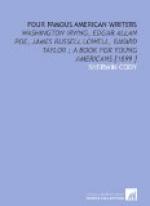As the years went on, Irving took a delight in this cottage that can hardly be expressed. At first he called it “Wolfert’s Roost”; afterward the name was changed to “Sunnyside,” the name by which it is still known. Little by little he bought more land, he planted trees, and cultivated flowers and vegetables. At one time he boasts that he has become so proficient in gardening that he can raise his own fruits and vegetables at a cost to him of little more than twice the market price.
During this period several books were published, among them a description of a tour on the prairies which he took soon after his return from abroad; a collection of “Legends of the Conquest of Spain” which had been lying in his trunk since his residence in the Alhambra seven or eight years before; and “Astoria,” a book of Western life and adventure, describing John Jacob Astor’s settlement on the Columbia river.
It was his wish to write a history of the conquest of Mexico, for which he had collected materials in Spain; but hearing that Prescott, the well-known American historian, was at work on the same subject, he gave it up to him.
The chief work of his later years was his “Life of George Washington.” This was a great undertaking, of which he had often thought. He was actually at work on it for many years, and it was finally published only a short time before his death in 1859.
Irving’s friends in the United States had long wished to give him some honor or distinction. He had been offered several public offices, among them the secretaryship of the navy; but he had declined them all. But in 1842, when Daniel Webster was secretary of state, Irving was nominated minister to Spain. It was Webster’s idea, and he took great delight in carrying out his plan. After the notification of his nomination had been sent to Irving, and Webster thought time enough had elapsed for him to receive it, he remarked to a friend: “Washington Irving is now the most astonished man in the city of New York.”
When Irving heard the news he seemed to think less of the distinction conferred upon him than of the unhappiness of being once more banished from his home. “It is hard—very hard,” he murmured, half to himself; “yet,” he added, whimsically enough (says his nephew), being struck with the seeming absurdity of such a view, “I must try to bear it. God tempers the wind to the shorn lamb.” Later, however, Irving speaks of this as the “crowning honor of his life.”
He remained abroad four years, when he sent in his resignation, and hurried home to spend his last years at Sunnyside.
His first thought was to build an addition to his cottage, in order to have room for all his nieces and nephews. His enjoyment in every detail of the work was almost that of a boy. Though now an old man, he seemed as sunny and as gay as ever. Every one who knew him loved him; and all the people who now read his books must have the same affectionate fondness for this most delightful of companions.




